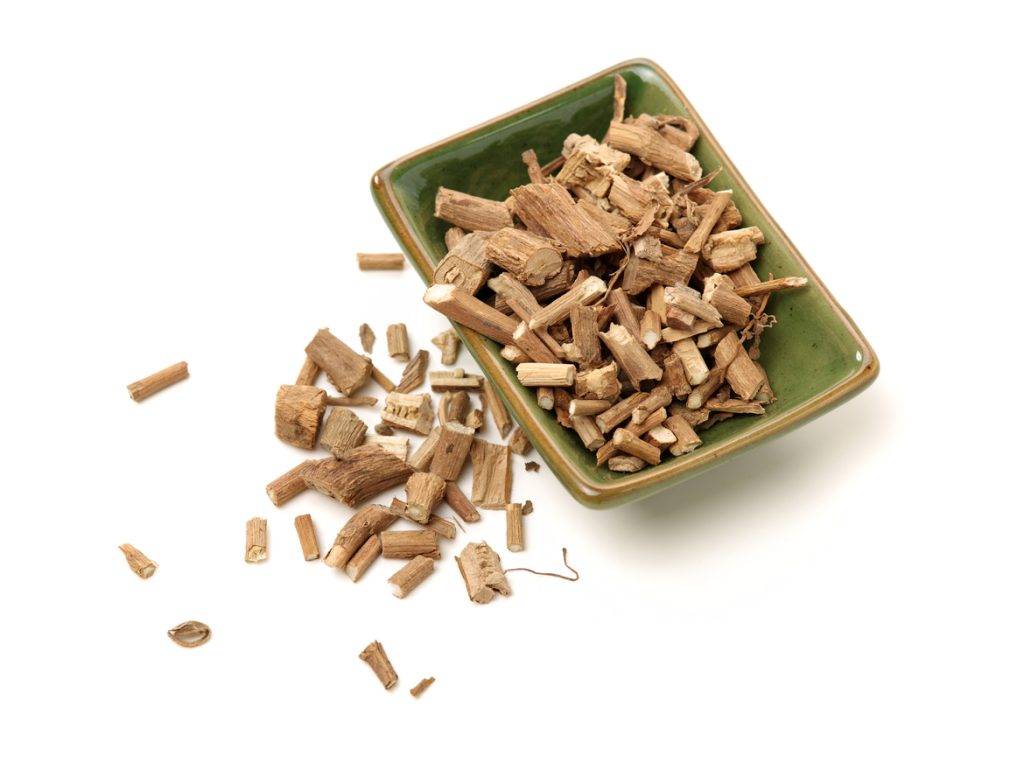Patchouli

What is Patchouli?
Patchouli (guang huo xiang, 广藿香), also known as Herba Pogostemon Cablin and Cablin Patchouli Herb, refers to the aerial part of Pogostemon Cablin, a plant in the family Lamiaceae.
The use of Herba Pogostemon Cablin stretches way back into prehistory. Although the plant is known to originate in Southeast Asia, the earliest documented records of its existence comes from ancient Egypt. When Tutankhamun’s tomb was opened, 10 gallons of Patchouli oil were found buried with the Pharaoh.
Patchouli also has a long and vibrant history in China, where it first appeared in Ming Yi Bie Lu, 名医别录 in 420 – 589 AD. Commonly used for medicinal purposes, the herb’s insecticidal properties were also later realised by Chinese silk merchants in the 18th century. They wrapped their silks around the dried leaves of the Patchouli plant, which helped their cargo to remain pest-free.
The Patchouli plant also has some economic value, as they are widely used in the flavour and fragrance industry, as well as the pharmaceutical industry. It can be used in commercial products such as soaps, detergents, body lotions, perfumes and health products.
In Traditional Chinese Medicine (TCM), Patchouli falls under the category of ‘aromatic herbs that transform Dampness’. Such herbs can relieve conditions caused by Cold-Damp stagnation, especially when it affects the stomach and Spleen. Warm in nature, this herb can help individuals who have too much Cold in their body, such as those experiencing a Yin Excess or a Yang Deficiency, to restore a harmonious yin-yang balance. Pungent in taste, Patchouli can promote the circulations of qi and body fluids. In particular, the herb targets the Lungs, the Spleen and the stomach.
Functions and Benefits of Patchouli
Traditional Chinese Medicine (TCM) shows that Patchouli has the following health benefits.
Patchouli can resolve Dampness, which makes it an effective herb for the Spleen’s dysfunction caused by obstruction in the middle jiao due to Dampness. Such obstruction is usually manifested as symptoms such as gastric and abdominal distention and fullness, bad breath, poor appetite, nausea, vomiting, diarrhoea and dysentery. Patchouli is also combined with other Dampness-drying and qi-moving herbs to enhance its effectiveness.
Patchouli can be indicated for all types of vomiting due to its effectiveness in arresting vomiting. The herb is also often combined with other herbs to address different types of vomiting. In particular, it is frequently indicated for vomiting caused by obstruction in the middle jiao caused by Dampness-turbidity. For example, to address vomiting caused by the failure of stomach qi to descend, Patchouli can be combined with other stomach-warming and vomiting-arresting herbs to enhance its effectiveness.
Patchouli can help to release the exterior and relieve the early stages of Wind-Cold exterior syndromes. By dispersing Wind-Cold, the herb can help to relieve symptoms such as fever with chills, headache and body ache caused by exogenous Wind-Cold or retention of Cold and Dampness in the interior. Patchouli is often combined with other Dampness-resolving or exterior-releasing herbs to enhance its effectiveness. In addition, Patchouli can help to treat fungal infections of hands and feet.
Modern studies have found that Patchouli may help to boost one’s mood as it can stimulate the production of serotonin and dopamine. The release of these hormones can reduce stress and tension. Also, many of the active constituents in Patchouli can act as a sedative to improve sleep quality. Patchouli may also boost one’s libido by promoting the production of sex hormones, dispel sexual anxiety and treat sexual problems such as erectile dysfunction and impotence.
Patchouli may help to stimulate the secretion of digestive enzymes and improve metabolism, which then promotes digestive health. It can also improve the absorption of nutrients, which leads to an increase in energy levels and reduce fatigue. Packed with antiphlogistic properties, Patchouli may help to soothe inflammation and prevent chronic diseases as well.
With a long history of use in beauty products, Patchouli can promote the regeneration of skin cells to keep one’s complexion smooth and healthy. With strong antibacterial properties, Patchouli can help to treat skin problems such as acne, skin infections, cracked skin and oily skin. The herb may also prevent hair loss. In addition, Patchouli can act as an insect repellent.

How to Use Patchouli
The recommended daily dosage of dried Herba Pogostemon Cablin is 5 – 10g. If used fresh, the dosage of Herba Pogostemon Cablin is usually doubled.
Aside from the raw herb, Herba Pogostemon Cablin can also be found in supplement forms and other commercial products, such as beauty products and hair products.
Cautions and Side Effects of Patchouli
Patchouli should not be used by individuals experiencing yin deficiency or excess Heat. Pregnant and breastfeeding ladies should stay away from this herb for the time being as well. Some common side effects associated with the overconsumption of Patchouli are flushing, night sweats, irritability or dry stools.
Summary
Here is a summary for Patchouli:
- Herb name (Chinese): 广藿香
- Herb name (Pin Yin): guǎng huò xiāng
- Herb name (English): Cablin Patchouli Herb
- Herb name (Botanical): Herba Pogostemonis
- Origin of species: Pogostemon cablin (Blanco) Benth.
- Part(s) of herb used: Plant parts above ground
- Geo-specific habitat(s): Guangdong, Hainan
- Taste(s) & Properties: Pungent; Slightly warm; Administrates the Spleen, Stomach and Lung Meridians
- Actions: Eases symptoms resulting fromstomach flu , e.g. lack of appetite, nausea or vomiting, constantly feeling tired, etc; Relieves symptoms associated with heat stroke
References
Swamy, M. K., & Sinniah, U. R. (2015). A comprehensive review on the phytochemical constituents and pharmacological activities of Pogostemon cablin Benth.: an aromatic medicinal plant of industrial importance. Molecules, 20(5), 8521-8547.[Accessed on 3rd January 2022]
Swamy, M. K., & Sinniah, U. R. (2016). Patchouli (Pogostemon cablin Benth.): botany, agrotechnology and biotechnological aspects. Industrial Crops and products, 87, 161-176. [Accessed on 3rd January 2022]
Share this article on
